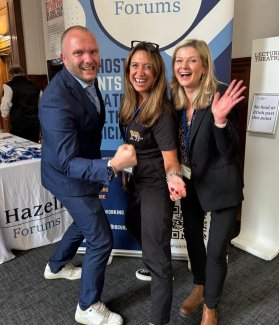Receiving an ADHD diagnosis can bring a sense of relief, but it often comes with questions, uncertainty, and the realisation that navigating life with ADHD may require new strategies and support. While professional input is essential, one resource is often underestimated: peer support.
Having access to a safe space where you can share experiences, learn from others, and build meaningful connections with people who truly understand what you're going through can make all the difference.
The Value of Peer Support in ADHD Understanding
Here are seven reasons why I believe peer support is particularly important for those newly diagnosed with ADHD:
1. You realise you’re not alone
It’s common for people with ADHD to feel misunderstood or isolated. Peer groups provide reassurance that others share your experience. Not only can you build connection with others who’s brains are wired in a similar way to yours, but you can resonate with others and feel less alone in your experiences. This alone can have a powerful impact on self-acceptance and confidence.
2. You learn from lived experience
While professional advice is valuable, hearing what has worked for others with ADHD can unlock new strategies. Often, these insights are creative, unconventional, or outside the box, exactly the kind of thinking that resonates within the ADHD community.
3. Your story has value
Sharing your own experiences in a peer group can support others while reinforcing your sense of self-worth. Being seen, heard, and appreciated for your insight helps counter some of the shame or self-doubt that you may have internalised.
4. There’s built-in accountability
Peer spaces create a sense of shared commitment. Attending regularly, checking in on progress, and supporting others can help with motivation, especially when executive function challenges make follow-through difficult. As these connections are not just limited to the groups, you may build connections outside of the group which allow you to experience ongoing support from others.
5. It’s a safe space to connect
Knowing that others in the group are there for the same reason makes it easier to show up as you are. There’s no need to explain or justify your ADHD experience, because the people around you already understand.
6. There’s room for joy
Support groups aren't just about managing challenges. They’re also spaces for humour, creativity, and connection, elements that can be incredibly energising and affirming, particularly for neurodivergent individuals.
7. You can practise new ways of relating
Peer support groups also provide a low-risk environment to explore communication styles, give and receive feedback, and reflect on emotional responses. These are key skills that can support growth across all areas of life.

My 12 Week New to Diagnosis ADHD Programme
When I was first diagnosed with ADHD, there were several things missing from the support I received that I now realise would’ve helped me come to terms with my diagnosis sooner.
One of the things I wish I had access to what a structured peer support programme with professional guidance from an ADHD specialist. In response to these needs, we’ve developed a new ADHD support package designed to combine the power of peer connection with thoughtful structure and evidence-based facilitation.
The programme offers:
- A supportive, non-judgemental group space
- Sessions grounded in shared experience and professional insight
- Tools to help you understand ADHD and your individual needs
- A balance of discussion, reflection, and action-based strategies
Whether you’re newly diagnosed or still making sense of how ADHD shows up in your life, this is a space where you can learn, be heard, and move forward with confidence.
Find out more about the programme here
Final Thoughts
Peer support isn't just a nice-to-have, it’s a vital part of the journey for many people living with ADHD. When we connect with others who understand us, we give ourselves permission to explore, grow, and find new ways of being in the world.